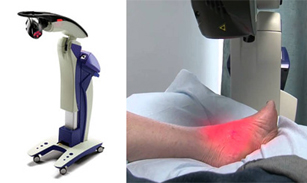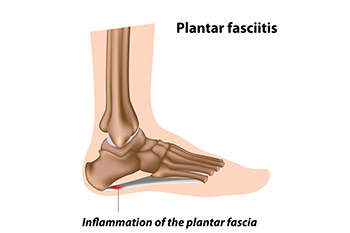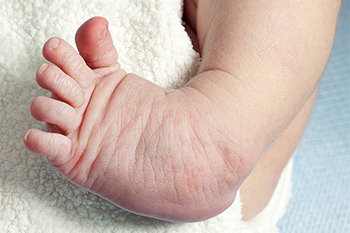Connect With Us
Blog
Items filtered by date: September 2023
Definition and Root Causes of Achilles Tendinitis

Achilles tendinitis, a painful condition affecting the Achilles tendon, is a common ailment among individuals who engage in sports and physical activities. This vital tendon connects the calf muscles to the heel bone and plays a crucial role in activities such as walking, running, and jumping. Achilles tendinitis is characterized by inflammation and micro tears in the Achilles tendon. This condition typically occurs due to overuse, intense physical activity, or sudden increases in exercise intensity. Wearing improper footwear, having tight calf muscles, and poor biomechanics can also contribute to its development. Understanding the definition and causes of Achilles tendinitis is essential for those seeking to prevent or manage this painful condition, allowing individuals to maintain an active lifestyle with proper care and precaution. If you have pain in the heel and calf areas, it is suggested that you confer with a podiatrist who can accurately diagnose and treat Achilles tendinitis.
Achilles tendon injuries need immediate attention to avoid future complications. If you have any concerns, contact Tanisha Richmond, DPM of Richmond Foot & Ankle, LLC. Our doctor can provide the care you need to keep you pain-free and on your feet.
What Is the Achilles Tendon?
The Achilles tendon is a tendon that connects the lower leg muscles and calf to the heel of the foot. It is the strongest tendon in the human body and is essential for making movement possible. Because this tendon is such an integral part of the body, any injuries to it can create immense difficulties and should immediately be presented to a doctor.
What Are the Symptoms of an Achilles Tendon Injury?
There are various types of injuries that can affect the Achilles tendon. The two most common injuries are Achilles tendinitis and ruptures of the tendon.
Achilles Tendinitis Symptoms
- Inflammation
- Dull to severe pain
- Increased blood flow to the tendon
- Thickening of the tendon
Rupture Symptoms
- Extreme pain and swelling in the foot
- Total immobility
Treatment and Prevention
Achilles tendon injuries are diagnosed by a thorough physical evaluation, which can include an MRI. Treatment involves rest, physical therapy, and in some cases, surgery. However, various preventative measures can be taken to avoid these injuries, such as:
- Thorough stretching of the tendon before and after exercise
- Strengthening exercises like calf raises, squats, leg curls, leg extensions, leg raises, lunges, and leg presses
If you have any questions please feel free to contact our office located in Dayton, OH . We offer the newest diagnostic tools and technology to treat your foot and ankle needs.
All About MLS Laser Therapy
 MLS laser therapy is an innovative method for treating pain. The concentration of lasers that are used, stimulate the body’s own healing process. The wavelengths may be able to replace surgery or medication, or they can help people recover quickly after surgery. This form of therapy has been known to help with arthritis, sprains, and inflammation. If you have Achilles tendonitis, plantar fasciitis, or another foot injury, MLS laser therapy could be a solution. For some patients, this therapy is the only treatment they use, claiming that a series of appointments keeps their pain manageable. For people with arthritis, this could help ease the long-term effects of the ailment. The lasers do not burn or hurt the skin, with most patients only feeling a slight warming sensation at the site of the treatment. If you have a foot or ankle condition that you believe may improve with MLS laser therapy, be sure to contact a podiatrist.
MLS laser therapy is an innovative method for treating pain. The concentration of lasers that are used, stimulate the body’s own healing process. The wavelengths may be able to replace surgery or medication, or they can help people recover quickly after surgery. This form of therapy has been known to help with arthritis, sprains, and inflammation. If you have Achilles tendonitis, plantar fasciitis, or another foot injury, MLS laser therapy could be a solution. For some patients, this therapy is the only treatment they use, claiming that a series of appointments keeps their pain manageable. For people with arthritis, this could help ease the long-term effects of the ailment. The lasers do not burn or hurt the skin, with most patients only feeling a slight warming sensation at the site of the treatment. If you have a foot or ankle condition that you believe may improve with MLS laser therapy, be sure to contact a podiatrist.
MLS Laser Therapy is a successful alternative for treating any pain you may be experiencing related to certain podiatric conditions. If you are interested in MLS Laser Therapy, consult with Tanisha Richmond, DPM from Richmond Foot & Ankle, LLC. Our doctor will assess your condition and provide you with quality foot and ankle treatment.
MLS Laser Therapy
Multiwave Locked System (MLS) Laser Therapy is a patented, FDA-cleared technology that helps relieve pain and inflammation from a number of podiatric conditions, including:
- Heel Pain
- Plantar Fasciitis
- Sports Injuries
- Wounds
- Achilles Tendonitis
- Arthritis
- Neuropathy
- Neuromas
MLS Laser Therapy is an ideal alternative to surgery and prescription medication, as it has no negative side effects and encourages accelerated healing. Among its many clinical benefits, MLS Laser Therapy also:
- Reduces swelling due to bruising or inflammation
- Blocks pain
- Reduces formation of scar tissue
- Improves nerve function
If you have any questions, please feel free to contact our office located in Dayton, OH . We offer the newest diagnostic and treatment technologies for all your foot care needs.
Gout Pain Can Be Managed
Chronic Plantar Fasciitis

Plantar fasciitis is a common and painful foot condition affecting millions of people annually, with approximately 20% of cases becoming chronic. Traditional treatments, such as stretching and medication, work in many but not all situations. The root cause of chronic plantar fasciitis is not inflammation, but tissue degeneration, which challenges the efficacy of anti inflammatory treatments. Surgery is an option but carries risks. Emerging minimally invasive therapies aim to stimulate tissue healing by enhancing local circulation. These include extracorporeal shockwave therapy, radiofrequency microtenotomy, platelet-rich plasma injections, and micromobile compression. Each of these treatments offers an alternative to traditional treatment or surgery for plantar fasciitis, and may help in chronic cases. Targeting the root cause of the ongoing nature of the condition is key. If you suffer from this disruptive affliction, it is suggested that you make an appointment with a podiatrist to discuss whether a minimally invasive therapy may be an option worthy of your consideration.
Plantar fasciitis is a common foot condition that is often caused by a strain injury. If you are experiencing heel pain or symptoms of plantar fasciitis, contact Tanisha Richmond, DPM from Richmond Foot & Ankle, LLC. Our doctor can provide the care you need to keep you pain-free and on your feet.
What Is Plantar Fasciitis?
Plantar fasciitis is one of the most common causes of heel pain. The plantar fascia is a ligament that connects your heel to the front of your foot. When this ligament becomes inflamed, plantar fasciitis is the result. If you have plantar fasciitis you will have a stabbing pain that usually occurs with your first steps in the morning. As the day progresses and you walk around more, this pain will start to disappear, but it will return after long periods of standing or sitting.
What Causes Plantar Fasciitis?
- Excessive running
- Having high arches in your feet
- Other foot issues such as flat feet
- Pregnancy (due to the sudden weight gain)
- Being on your feet very often
There are some risk factors that may make you more likely to develop plantar fasciitis compared to others. The condition most commonly affects adults between the ages of 40 and 60. It also tends to affect people who are obese because the extra pounds result in extra stress being placed on the plantar fascia.
Prevention
- Take good care of your feet – Wear shoes that have good arch support and heel cushioning.
- Maintain a healthy weight
- If you are a runner, alternate running with other sports that won’t cause heel pain
There are a variety of treatment options available for plantar fasciitis along with the pain that accompanies it. Additionally, physical therapy is a very important component in the treatment process. It is important that you meet with your podiatrist to determine which treatment option is best for you.
If you have any questions, please feel free to contact our office located in Dayton, OH . We offer the newest diagnostic and treatment technologies for all your foot care needs.
Definition, Causes, and Treatment of Clubfoot

Clubfoot, a congenital condition, impacts the development of a newborn's foot or feet, leading to an abnormal position. The foot is turned inward and downward, resembling the shape of a golf club, hence the name. While the exact cause is not always clear, both genetic and environmental factors can play a role. During pregnancy, abnormal positioning of the baby's feet in the womb can contribute to developing clubfoot. Early treatment of this condition is important and generally begins within weeks of birth. The Ponseti method, a non-surgical approach involving gentle manipulation and casting, is a common treatment. Braces are used to maintain correction after the casting phase. In some cases, surgery may be necessary. Timely intervention and comprehensive treatment enable children with clubfoot to lead active, fulfilling lives. If your child has been born with clubfoot, it is strongly suggested that you contact a podiatrist who can determine what the best course of treatment is to pursue.
Some foot conditions may require additional professional care. If you have any concerns, contact Tanisha Richmond, DPM of Richmond Foot & Ankle, LLC. Our doctor can provide the care you need to keep you pain-free and on your feet.
Rare Foot Conditions
The majority of foot conditions are common and can be treated by a podiatrist. Standard diagnostic procedures are generally used to identify specific conditions and treatment can be rendered. A podiatrist also treats rare foot conditions which can be difficult to diagnose and may need extra attention and care.
There are many rare foot conditions that can affect children. Some of these can include:
- Freiberg’s disease
- Kohler’s disease
- Maffucci syndrome
Freiberg’s disease - This can be seen as a deterioration and flattening of a metatarsal bone that exists in the ball of the foot. It typically affects pre-teen and teenage girls, but can affect anyone at any age. Symptoms that can accompany this can be swelling, stiffness, and the patient may limp.
Kohler’s disease - This often targets the bone in the arch of the foot and affects younger boys. It can lead to an interruption of the blood supply which ultimately can lead to bone deterioration. The patient may limp or experience tenderness, swelling, and redness.
Maffucci syndrome - This affects the long bones in a child’s foot leading to the development of abnormal bone lesions. They are benign growths and typically develop in early childhood and the bones may be susceptible to breaking.
A podiatrist can properly diagnose and treat all types of rare foot conditions. If your child is affected by any of these symptoms or conditions, please don’t hesitate to call our office so the correct treatment method can begin.
If you have any questions please feel free to contact our office located in Dayton, OH . We offer the newest diagnostic tools and technology to treat your foot and ankle needs.
Are Bunions Affecting Your Everyday Life?
Blog Archives
- April 2025
- March 2025
- February 2025
- January 2025
- December 2024
- November 2024
- October 2024
- September 2024
- August 2024
- July 2024
- June 2024
- May 2024
- April 2024
- March 2024
- February 2024
- January 2024
- December 2023
- November 2023
- October 2023
- September 2023
- August 2023
- July 2023
- June 2023
- May 2023
- April 2023
- March 2023
- February 2023
- January 2023
- December 2022
- November 2022
- October 2022
- September 2022
- August 2022
- July 2022
- June 2022
- May 2022
- April 2022
- March 2022
- February 2022
- January 2022
- December 2021
- November 2021
- October 2021
- September 2021
- August 2021
- July 2021
- June 2021
- May 2021
- April 2021
- March 2021
- February 2021
- January 2021
- December 2020
- November 2020
- October 2020
- September 2020
- August 2020
- July 2020
- June 2020
- May 2020
- April 2020
- March 2020
- February 2020
- January 2020
- December 2019
- November 2019
- October 2019
- September 2019
- August 2019
- July 2019
- June 2019
- May 2019
- April 2019
- March 2019
- February 2019
- January 2019
- December 2018
- November 2018

